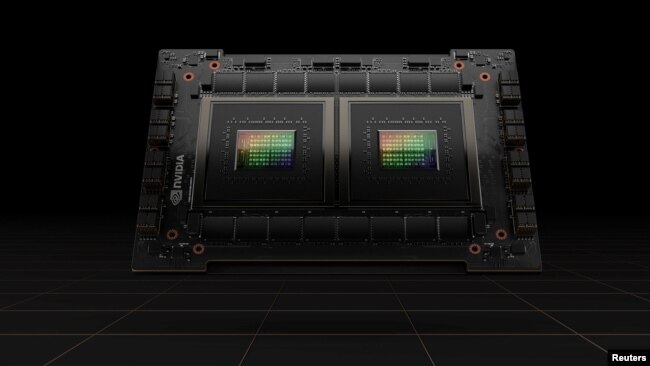社会体制の違う国家間との経済と安全保障は、利益相反する事柄です!
でも、規制は相手国内での開発に拍車がかかるのでは?
ハイエンドなんて、語れない日本!
競争力ダウンに加えてこの円安では、すべからく買い負けしてしまっています!!
VOAで英語学びましょう!
報告書: 禁止された米国製コンピューター・チップ、中国で高い需要(和訳)
Report: Banned US Computer Chips in High Demand in China
September 08,2022
中国のトップクラスの研究と教育機関の一部は、輸出規制がかかっている米国のコンピューターチップに依存していると、報道されています。
米国に拠点を置くチップメーカーのエヌビディアNvidiaは先週、米国当局から中国、香港、ロシアに2つのトップコンピューターチップを輸出できなくなったと告げられたと発表しました。
この高性能チップは、主要なコンピューターデータセンターに電力を供給し、人工知能(AI)システムをサポートするために設計されています。
米国当局は、武器に使われる可能性のあるチップ技術の普及を抑えるために輸出制限が必要だと述べています。今回の規制は、ビデオゲームや自動車技術に広く使用されている、よりよく知られたNvidiaの製品には影響しません。
Nvidiaは、輸出禁止は同社のA100とH100チップに影響し、これらは機械学習操作にさらなるパワーを追加するよう設計されていると言います。同社のH100チップはまだ開発中です。Nvidiaは公式の財務報告書の中で、輸出規制によってH100チップの進捗が止まる可能性があると述べています。同社は、この禁止がまた、企業に業務の一部を中国から移転する必要が生じる可能性があると言います。
同じく米国のチップメーカー、アドバンスト・マイクロ・デバイセズ(AMD)社も、米商務省から中国とロシアへの一部の高性能チップの出荷を阻止する命令を受けたことを確認しました。ただしAMDは、この規制が製品開発が遅れたり、事業運営に大きな支障が生じたりすることはないとしています。
中国は、米国の輸出規制を批判しました。米当局が輸出規制を悪用して、中国への高性能チップの販売を制限していると非難しています。中国商務省の報道官は、貿易制限はサプライチェーンの問題を悪化させ、COVID-19パンデミック後の世界経済の回復努力を遅らせることになると警告しています。
コンピューター・チップは中国にとって最大の輸入品です。コンピューター・チップに関する中国の懸念は、COVID-19のためにチップ工場での作業が減速したため、過去2年間に増大しました。
ロイター通信はこのほど、中国における制限されたチップの需要レベルを確認するために、過去2年間の企業の支払いデータを調査しました。
調査の過程で、記者は中国のスィンホワ大学(清華大学)が昨年10月、NvidiaのAIスーパーコンピュータ2台に40万ドル以上を支払っていることを発見しました。各コンピュータには4つのA100チップが搭載されていることが、企業の財務データから判明しました。清華大学は、中国で最高ランクの高等教育機関の1つです。
同月、中国の計算機技術研究所は、A100チップに約25万ドルを費やしました。この研究所は、国内トップの研究グループである中国科学院(CAS)の一部です。
CAS大学の人工知能学部は7月、ハイテク機器に約20万ドルを費やしたことが、ロイターの報道で明らかになりました。その機器には、A100チップを部分的に搭載したサーバーが含まれていました。
また、11月には、グァンドン サン(広東省)にあるジナン大学(済南大学)のサイバーセキュリティ学部が、NvidiaのAIスーパーコンピュータに9万3000ドル以上を費やしました。さらに、同大学の知能システム科学・工学部では、つい先月、10万ドル近くを費やして8個のA100チップを購入しました。
地方政府や地域政府が支援する他の研究所や大学も、A100チップを購入したことがロイターの報道で明らかになりました。
ロイター通信が接触した研究部門のいずれも、チップの制限に関するコメントを求める要請に答えていません。
Nvidia社もコメントを求めても回答しませんでした。しかし同社は最近、9月までの3ヵ月間に、影響を受けたチップの中国での売上が4億ドルに上ったと発表しました。同社は、同社の顧客が他のNvidia製品を購入しないことを決定した場合、そのビジネスの多くが失われる可能性があると述べています。Nvidiaはまた、新規則の適用除外を求める予定であるとも述べています。
Report: Banned US Computer Chips in High Demand in China
Some of China’s top research and educational organizations depend on U.S. computing chips that have export restrictions on them, news reports say.
U.S.-based chip maker Nvidia said last week it had been told by American officials it could no longer export two top computer chips to China, Hong Kong or Russia.
The high-end chips are designed to help power major computer data centers and support artificial intelligence (AI) systems.
U.S. officials have said the export restrictions are necessary to limit the spread of chip technology that can be used for weapons. The restrictions do not affect Nvidia’s better-known products widely used in video games and automotive technology.
Nvidia said the export ban affects its A100 and H100 chips, which are designed to add more power to machine learning operations. The company’s H100 chip is still in development. Nvidia said in an official financial report that the export restriction could halt progress on the H100 chip. The company said the ban may also require the company to move some of its operations out of China.
Another American chip maker, Advanced Micro Devices (AMD), has confirmed that it also received an order from the U.S. Department of Commerce to block shipments of some of its high-end chips to China and Russia. AMD, however, said the restrictions were not expected to delay any product development or greatly harm its business operations.
China criticized the U.S. export restrictions. It accuses U.S. officials of misusing export controls to limit high-end chip sales to China. A spokesperson for China’s Commerce Ministry warned the trade limits would worsen supply chain problems and slow world economic recovery efforts after the COVID-19 pandemic.
Computer chips are China’s largest import. China’s concern about computer chips grew over the last two years as work at chip factories slowed because of COVID-19.
Reuters news agency recently examined corporate payment data over the past two years in an effort to see the level of demand for the restricted chips in China.
During the examination, reporters discovered China’s Tsinghua University spent over $400,000 last October on two Nvidia AI supercomputers. Each of the computers is powered by four A100 chips, corporate financial data showed. Tsinghua is one of China's highest-ranked higher education institutions.
In the same month, China’s Institute of Computing Technology spent about $250,000 on A100 chips. The institute is part of the country’s top research group, the Chinese Academy of Sciences (CAS).
The school of artificial intelligence at a CAS university spent about $200,000 on high-tech equipment in July, the Reuters report shows. The equipment included a server partly powered by A100 chips.
And in November, the cybersecurity college of Guangdong-based Jinan University spent more than $93,000 on an Nvidia AI supercomputer. In addition, the university’s school of intelligent systems science and engineering spent nearly $100,000 just last month on eight A100 chips.
Other institutes and universities supported by local and area governments also bought A100 chips, the Reuters report showed.
None of the research departments contacted by Reuters answered requests seeking comment on the chip restrictions.
Nvidia also did not answer a request for comment. But it recently said it had reported $400 million in Chinese sales of the affected chips for the three- month period ending in September. The company said much of that business could be lost if its customers decide not to buy other Nvidia product offerings. Nvidia also said it planned to seek exemptions to the new rules.
Words in This Story
chip – n. a small piece of semiconducting material used to make parts that help power computer processors
high-end – adj. (business) a class of products that are costlier and of better quality than similar, less costly products
artificial intelligence – n. the development of computer systems with the ability to perform work that normally requires human intelligence
institution – n. a large and important organization
supply chain – n. the system of people and things that gets a product from its place of manufacture to the person who buys it
customer – n. a person or company that buys goods and services
exemption – n. special permission not to have to do something or pay something
